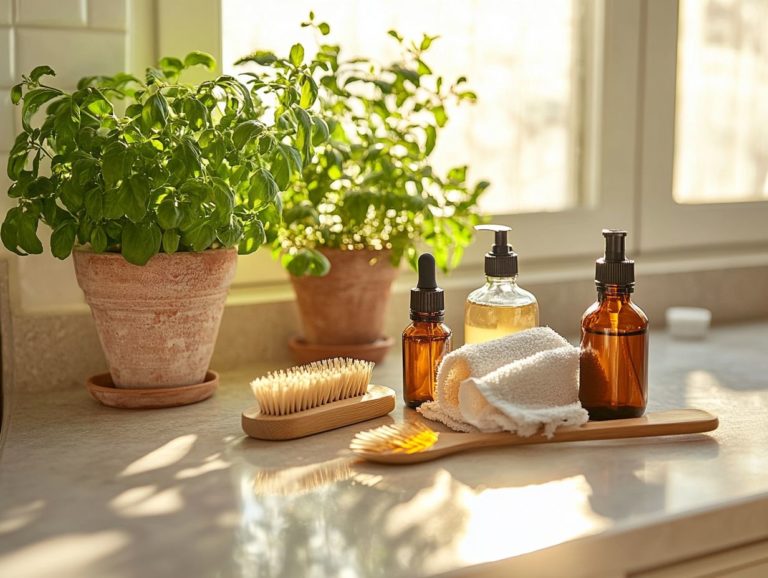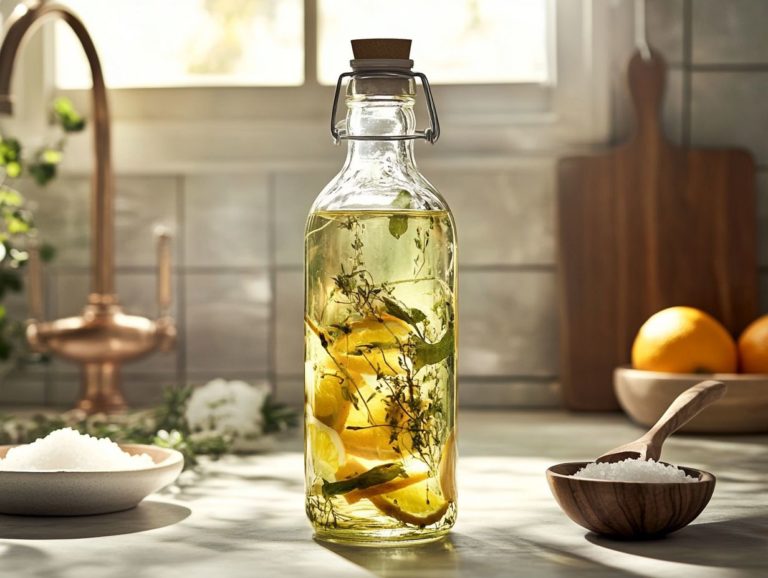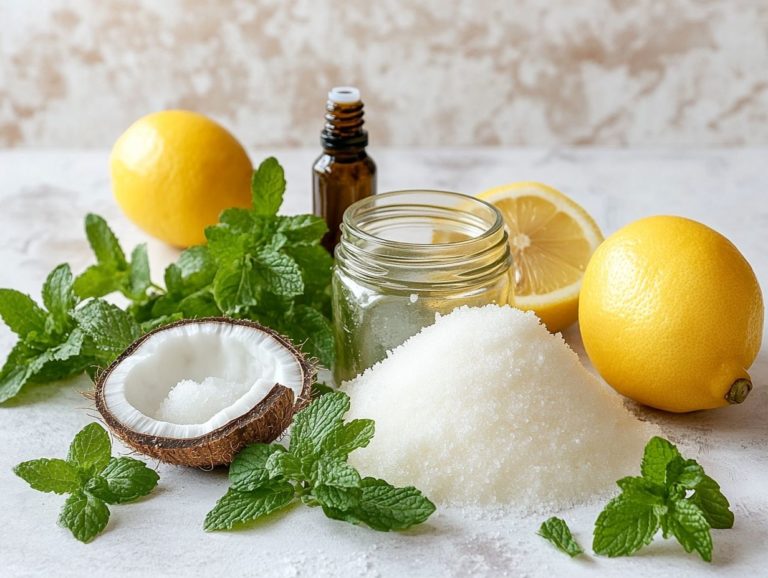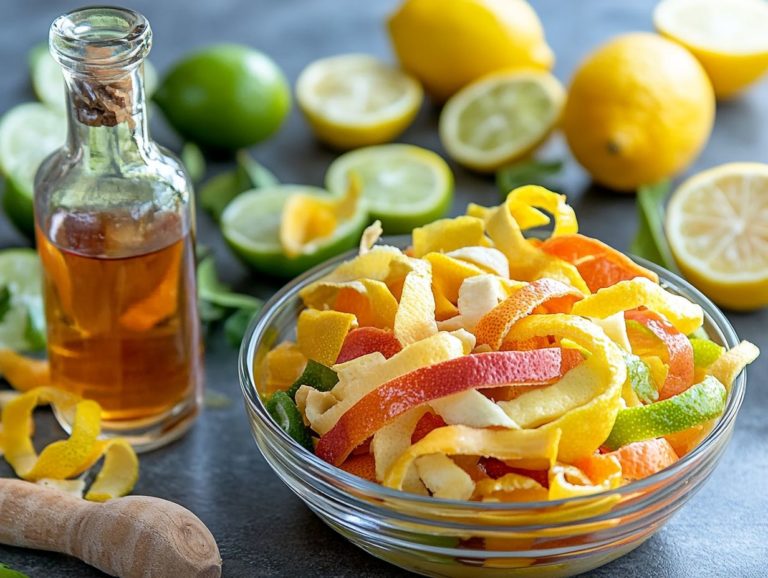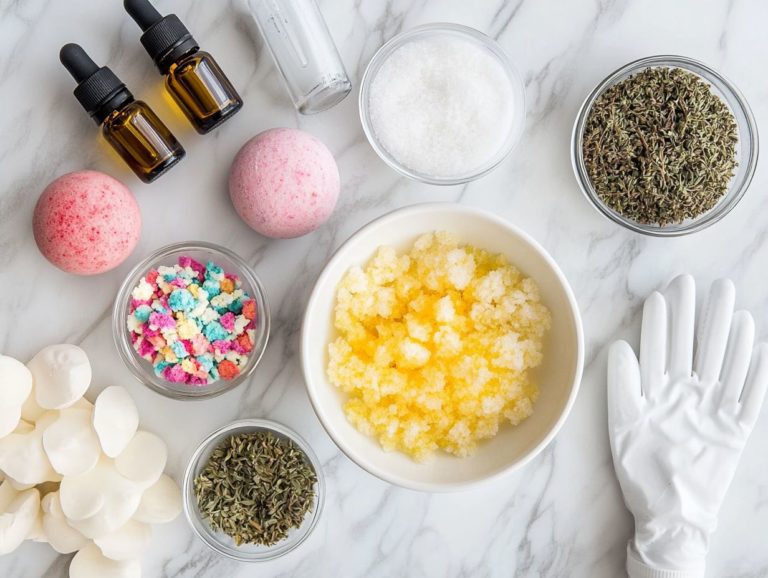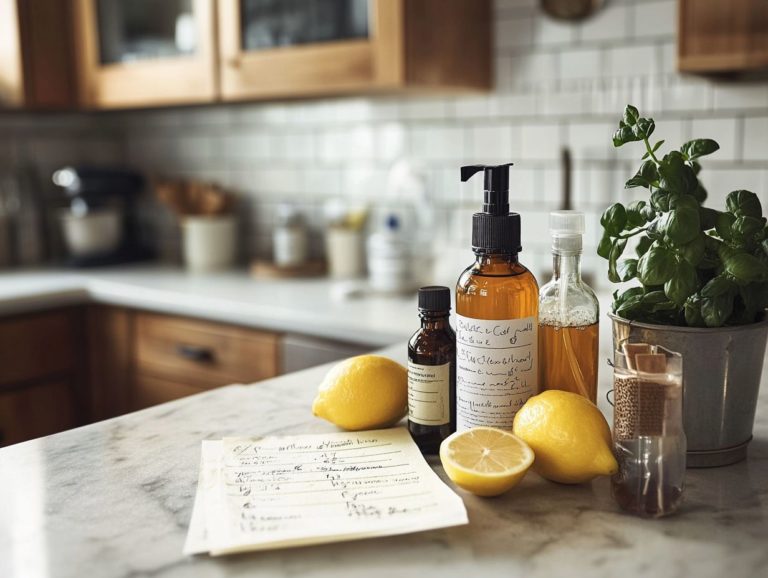Homemade Cleaner to Remove Hard Water Deposits
Hard water deposits can be an ongoing challenge in your home. They often leave unsightly stains on your fixtures, appliances, and dishes. Hard water stains look bad and can make your appliances work harder.
Recognizing what these deposits are and understanding their causes is the essential first step in addressing the problem. This article delves into the effects of hard water on your living space. It examines common household cleaners and outlines the benefits and potential drawbacks of creating your own homemade cleaner. We’ll also cover effective methods and home cleaning tips to help maintain a cleaner home.
With practical tips, detailed step-by-step instructions, and insights from cleaning experts like Lauren Wellbank and Martha Stewart, you ll be fully prepared to tackle those stubborn deposits and keep your home sparkling clean.
Contents
- Key Takeaways:
- What Are Hard Water Deposits?
- What Causes Hard Water Deposits?
- How Do Hard Water Deposits Affect Household Items?
- What Are Common Household Cleaners for Hard Water Deposits?
- Why Make a Homemade Cleaner for Hard Water Deposits?
- How To Make a Homemade Cleaner for Hard Water Deposits?
- How To Use the Homemade Cleaner?
- What Are Some Tips for Preventing Hard Water Deposits?
- Frequently Asked Questions
- What is a homemade cleaner to remove hard water deposits?
- What ingredients are needed to make a homemade cleaner to remove hard water deposits?
- How does white vinegar work to remove hard water deposits?
- Can a homemade cleaner to remove hard water deposits be used on all surfaces?
- How often should I use a homemade cleaner to remove hard water deposits?
- Are there any precautions I should take when using a homemade cleaner to remove hard water deposits?
Key Takeaways:
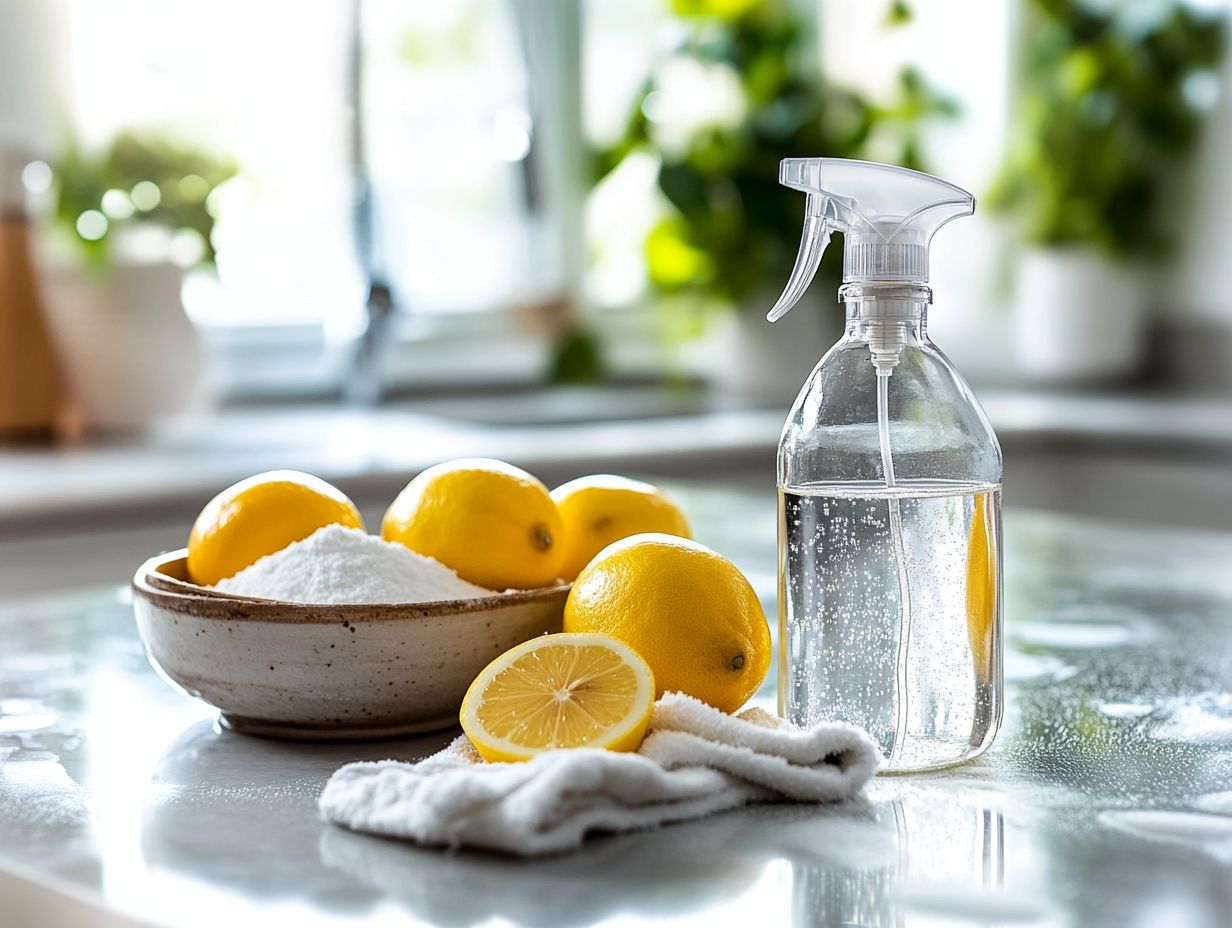
- Hard water deposits can cause damage to household items such as plumbing fixtures, appliances, clothing, and dishes.
- Making a homemade cleaner for hard water deposits can be cost-effective and eco-friendly, but it also carries potential risks. Natural cleaners like vinegar and baking soda are popular choices.
- To make a homemade cleaner, you need common household ingredients like vinegar and baking soda. Follow proper precautions when using it on surfaces. Preventative measures can help reduce build-up.
What Are Hard Water Deposits?
Hard water deposits, often called hard water stains, are those pesky white mineral residues that accumulate on surfaces due to the high mineral content in your water specifically calcium and magnesium. You might notice these unsightly deposits on faucets, shower doors, and glass surfaces around your home, making them a real nuisance to clean.
These stains are more than just an eyesore; they signal hard water buildup, which can lead to more significant problems if left unchecked. Knowing what these deposits are helps you clean better and take care of your home, as they impact not only the visual appeal of your space but also the longevity of your household items.
What Causes Hard Water Deposits?
Hard water deposits are a result of high mineral content in your water, particularly calcium and magnesium. When the water evaporates, these minerals are left behind, leading to those pesky hard water stains on various surfaces throughout your home. The mineral content can vary based on your geographical location. As water flows through pipes, it picks up minerals from the surrounding soil and rocks, causing hard water buildup over time. If you don t take effective measures, such as installing a water softener, these deposits can accumulate and turn into significant maintenance headaches.
Your plumbing conditions can make this situation even worse. Older pipes tend to retain more minerals, which contributes to the formation of stubborn deposits. If you live in an area with hard water, you might find yourself constantly battling unsightly stains on your fixtures, dishes, and even in your cleaning appliances. This not only affects the appearance of your home but can also lead to increased wear and the need for more frequent replacements.
Don t wait! Start using simple solutions like water softeners or regularly using specialized cleaning products designed for household items. These strategies can be incredibly effective, helping to reduce hard water buildup and prolonging the life of your plumbing systems. In the long run, this will make home maintenance easier and more efficient for you.
How Do Hard Water Deposits Affect Household Items?
Hard water deposits can have a profound impact on your household items. They cause stubborn stains that are not only unattractive but can also diminish the efficiency of your appliances and fixtures over time. Cleaning solutions like a baking soda paste can help with stubborn stain removal.
When these deposits accumulate on faucets, shower doors, and kitchen sinks, they can obstruct water flow and foster an environment ripe for soap scum and other residues.
To combat this buildup, it becomes essential to employ effective cleaning techniques for stubborn stain removal. Get to know the best eco-friendly cleaning products to maintain your household items.
What Are the Effects on Plumbing Fixtures?
Hard water deposits can lead to unsightly stains that take away from the appearance of plumbing fixtures. Over time, these deposits can clog aerators and reduce water flow. This makes it essential to use effective cleaning products.
Regular maintenance and targeted cleaning techniques are crucial for removing stubborn stains and preventing further buildup. Don t wait! Start maintaining your fixtures today to avoid costly repairs later.
The presence of these mineral deposits can create an uninviting atmosphere, diminishing the overall aesthetics of your bathrooms and kitchens. To tackle hard water stains effectively, consider utilizing specialized cleaning solutions or household supplies specifically designed for this purpose.
Options like vinegar or commercial descalers can be incredibly effective in dissolving those stubborn deposits. Keep your fixtures looking great! Just a quick wipe-down and a protective coating can make a big difference.
How Do Hard Water Deposits Affect Appliances?
Hard water deposits can wreak havoc on your household appliances like dishwashers and washing machines. These mineral deposits can cause poor performance, increased energy consumption, and even costly breakdowns.
To combat these issues, it’s crucial to implement effective cleaning techniques and consider solutions such as installing a water softener. Doing so will help minimize hard water stains and extend the life of your appliances.
If you neglect to tackle these mineral build-ups, you may find your appliances operating at reduced efficiency. It’s wise to regularly clean your sink and other appliances with a simple mixture of vinegar and baking soda.
Establishing a routine maintenance schedule that includes descaling will not only keep your kettles and coffee makers functioning at their best but also enhance their longevity. Using distilled water can help prevent mineral accumulation, making it easier to keep your appliances clean in the long run.
What Are the Effects on Clothing and Dishes?
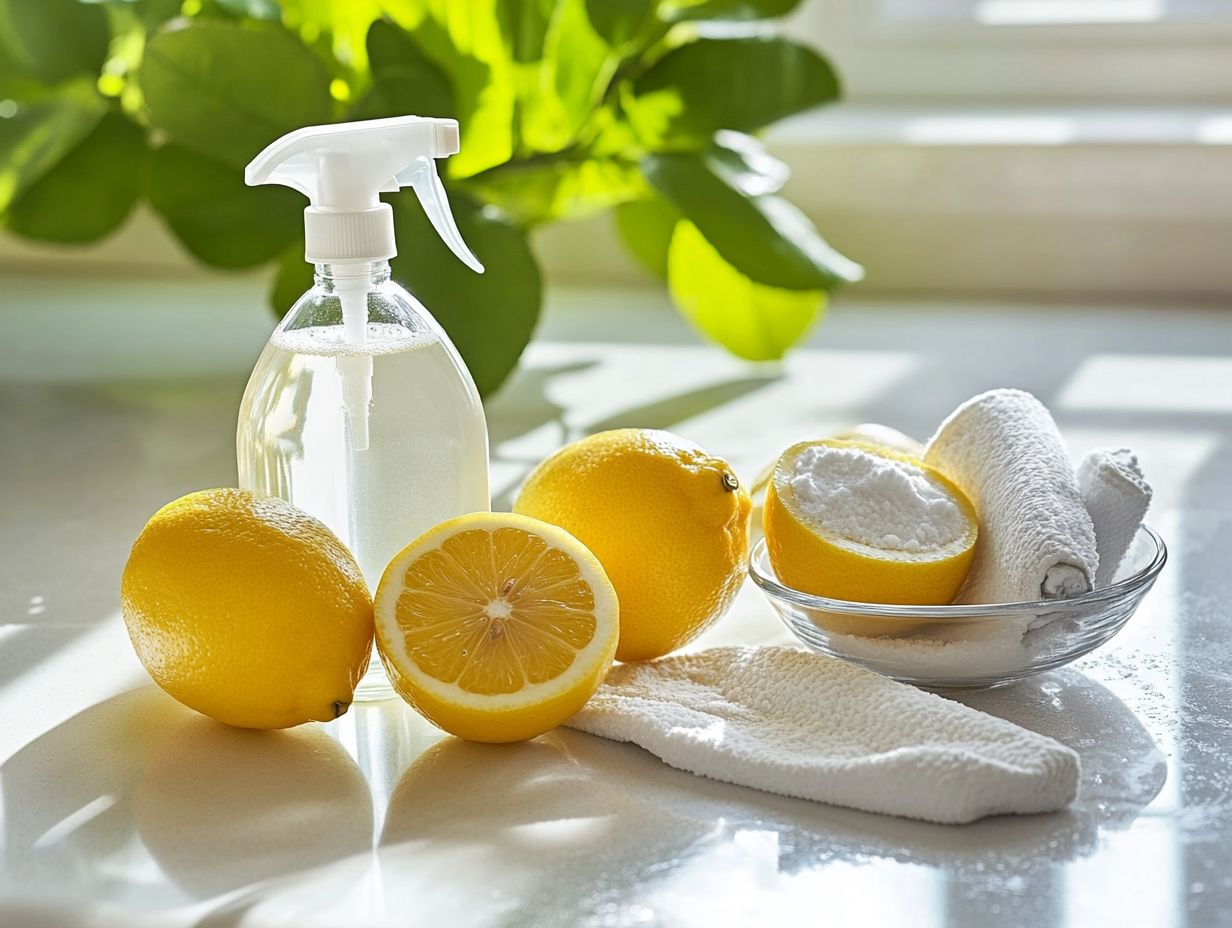
The presence of hard water deposits can undermine not just your plumbing and appliances, but also the cleanliness and appearance of your clothing and dishes. When you wash items in hard water, those pesky mineral deposits can leave them looking dull or dingy, and you may also notice soap scum showing up.
By adopting effective hard water removal strategies and utilizing the right cleaning methods, you can significantly elevate the quality of your laundry and dishwashing results. It s essential to grasp how these mineral buildups happen.
Minerals like calcium and magnesium can leave unsightly marks on surfaces and fabrics, but you have the power to combat them. For sparkling clean dishes and bright, refreshed clothing, consider using alternative detergents specifically formulated for hard water conditions.
Adding white vinegar or baking soda to your cleaning routine will work wonders as they effectively dissolve mineral buildup. Regular maintenance techniques, such as rinsing your appliances with vinegar and choosing the right fabric softeners, will help keep your clothing and dishware looking vibrant and free from the dulling effects of hard water.
With these steps, you can transform your cleaning routine and enjoy the results that come with it. Try these methods today for sparkling fixtures!
What Are Common Household Cleaners for Hard Water Deposits?
When you set out to conquer those pesky hard water deposits, several common household cleaners can work wonders! Think vinegar solutions, baking soda paste, and hydrogen peroxide cleaning methods. These natural options can break down stubborn mineral deposits and restore shine to surfaces marred by hard water stains.
Choosing eco-friendly cleaning products not only keeps your home sparkling clean but also creates a safer environment for your family. Many people find that these alternatives deliver impressive results without the harsh chemicals typically found in conventional cleaning solutions. For example, mixing equal parts white vinegar and water effectively dissolves mineral buildup on your faucets and showerheads.
Combining baking soda with water transforms it into a gentle abrasive that can scrub away those stubborn stains. Commercial plant-based cleaners strike a wonderful balance between efficacy and environmental consciousness, making them an excellent choice for families eager to minimize their impact on the environment.
By opting for these safe and effective methods, you can tackle hard water problems while caring for both your home and the planet.
Why Make a Homemade Cleaner for Hard Water Deposits?
Crafting your own homemade cleaner for hard water deposits is a cost-effective and environmentally conscious choice! This approach enables you to combat those stubborn stains while safeguarding your household’s health.
Utilizing DIY natural cleaners for home maintenance provides an excellent alternative to commercial solutions filled with harsh chemicals. Opting for DIY natural cleaners means embracing a safer alternative, including eco-friendly cleaning options that align with your values.
With just a few simple ingredients like vinegar and baking soda, you can develop effective methods for hard water removal that deliver cleaning power. This includes creating a baking soda paste for stubborn stain removal.
What Are the Benefits of Using a Homemade Cleaner?
Using a homemade cleaner for hard water deposits offers many benefits! From cleaning your bathroom to kitchen cleaning tips, you’ll enjoy significant cost savings and the freedom to customize your cleaning solutions to fit your specific needs.
Homemade cleaners tackle stubborn stains effectively without using harsh chemicals, making them safe for both the environment and your household. They also provide valuable cleaning hack solutions for various challenges.
With ingredients like vinegar and baking soda, you can whip up powerful methods that are simple to prepare and highly efficient in combating hard water buildup. Cleaning experts, including Lauren Wellbank and Martha Stewart, recommend homemade cleaners for their safety and effectiveness.
Natural cleaners save you money and reduce the risks associated with chemical exposure, particularly if you have young children or pets at home. They also support stains prevention efforts while being safe for the environment! Unlike commercial cleaning products, which often contain hard-to-pronounce ingredients, homemade alternatives offer peace of mind, ensuring every component is safe and non-toxic. This approach is endorsed by experts like Jennifer Parnell of Humble Suds and Katie Dills from The Cleaning Authority.
With just a few common household items, you can create effective cleaning solutions that rival store-bought products, delivering reliable performance while being gentle on surfaces. For instance, vinegar and baking soda make a potent combination!
By embracing homemade cleaners, you take control of your cleaning routine, aligning it with your values of sustainability and health.
What Are the Potential Risks of Using a Homemade Cleaner?
While homemade cleaners can undoubtedly offer a range of benefits, it s essential not to overlook the potential risks that come with their use. Refer to household tips and home cleaning tips to avoid common pitfalls. Improper ingredient combinations might lead to ineffective cleaning or, worse yet, cause damage to your surfaces. For instance, using the wrong cleaning techniques can result in subpar performance.
Not every homemade cleaner is suited for all materials, and some may require dilution or additional cleaning methods to achieve the desired results. Following guidelines and employing effective techniques is key, all while ensuring that your cleaning solutions remain environmentally friendly.
For example, using vinegar on natural stone countertops could result in etching, while baking soda might scratch delicate surfaces. Such mistakes can be avoided by following cleaning methods recommended by cleaning experts. Thus, it s vital to carefully consider the properties of each ingredient, opting for gentle mixtures that work harmoniously together and deliver adequate cleaning power without compromising the integrity of your surfaces.
Understanding which cleaning products can be safely combined, such as mixing castile soap with water for light cleans, can significantly enhance your DIY cleaning efforts. This is a common cleaning hack used by many. Ultimately, striking a balance between safety and effectiveness is crucial for maintaining a pristine environment without encountering unforeseen drawbacks. For additional advice, consult sources like Better Homes & Gardens and Prevention.
How To Make a Homemade Cleaner for Hard Water Deposits?
Creating a homemade cleaner for hard water deposits is a remarkably simple endeavor that relies on everyday ingredients typically found in your kitchen, such as vinegar and baking soda. These ingredients are part of numerous household supplies.
When these two powerhouses come together, they form a formidable cleaning solution, enabling you to effectively combat hard water stains and mineral buildup on a variety of surfaces. This cleaning hack is effective and easy to implement.
By adhering to proven methods for preparation and application, you can craft a safe and efficient cleaner that not only tackles those pesky stains but also contributes to a healthier living environment.
What Ingredients Are Needed?
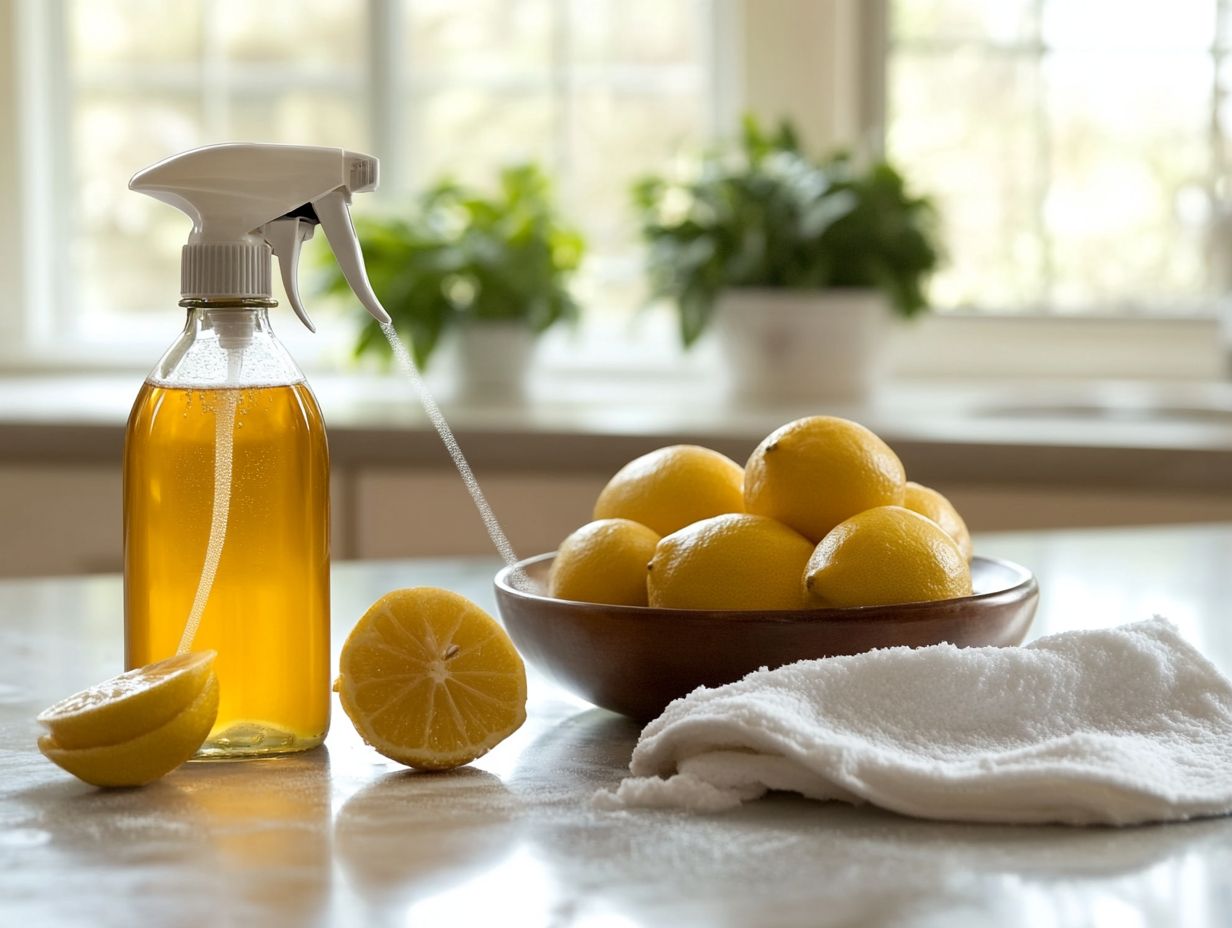
To create an effective homemade cleaner for hard water deposits, you ll need a few key ingredients that are both easy to find and remarkably effective against stubborn stains. These include vinegar solution and hydrogen peroxide. Start with distilled white vinegar, a natural acid that works wonders in dissolving mineral deposits. Pair that with baking soda, renowned for its gentle abrasive qualities, which help scrub away buildup without scratching your surfaces. Together, these ingredients form a powerful cleaning solution that is safe for both your home and the environment. This is recommended by cleaning experts and organizations like Bob Hoegler Plumbing.
To further amplify your cleaning prowess, add a few drops of liquid dish soap. You may also include plant-based cleaners for an extra boost. This will cut through the grease and grime that often accompanies those pesky deposits. Consider using CLR Pro Spray Cleaner for tough jobs. For an extra touch, consider incorporating essential oils like lemon or tea tree oil. Not only do they provide a delightful fragrance, but they also bring antibacterial properties, making your cleaner not just effective but refreshingly aromatic.
By blending these components, you ll create a versatile cleaner that outshines many commercial products, proving that effective cleaning methods can be achieved effortlessly at home without resorting to harsh chemicals. This approach is frequently highlighted in Better Homes & Gardens and The Washington Post.
What Are the Steps to Make the Cleaner?
Creating your own homemade cleaner for hard water deposits is a straightforward process that lets you tap into the remarkable cleaning power of vinegar and baking soda. People love this process for its simplicity! Start by mixing equal parts of distilled white vinegar and water in a spray bottle. Then, introduce a few tablespoons of baking soda, and watch as the bubbly reaction enhances your cleaner’s effectiveness.
A gentle shake is all you need to combine the ingredients. Just like that, you have a potent homemade cleaner ready to tackle those annoying hard water stains on various surfaces. For more tips, check home cleaning tips.
To achieve the best results, be discerning about the surfaces you choose to clean with this vinegar solution. For example, glass surfaces can yield excellent results. It’s wise to avoid natural stone, as it could be damaged by the acidity of the vinegar.
When you’re set to apply your concoction, generously spray the cleaner onto the stained areas and let it sit for about 5-10 minutes (the period the cleaner sits on the surface). Follow these cleaning techniques for optimal outcomes. This dwell time allows the solution to penetrate and break down those stubborn hard water deposits.
When the time is up, grab your soft cloth or sponge and scrub the area gently, then rinse with warm water to wash away any residue. This method is highly effective for cleaning your sink. If you encounter particularly stubborn stains, don’t hesitate to repeat the process or use a pumice stone with care.
By following these proper cleaning techniques, you can keep your fixtures looking sparkling clean and free from buildup. This approach is recommended by Alicia Sokolowski from AspenClean.
How To Use the Homemade Cleaner?
Utilizing your homemade cleaner for hard water deposits is an effortless yet effective approach that can produce remarkable results when executed properly. For more guidance, check home cleaning tips.
Start by pinpointing the surfaces you intend to address whether it s faucets, shower doors, or glass surfaces. These are commonly recommended areas for faucet cleaning and shower doors cleaning.
Generously apply the homemade cleaner to the affected area, allowing it to rest for a few minutes so it can penetrate those stubborn mineral deposits. Then, simply take a scrub brush or cloth to wipe away the residue.
This method guarantees a thorough clean and protects delicate surfaces from scratches, leaving them sparkling and pristine. This is often a focal point in cleaning appliances.
What Surfaces Can It Be Used On?
Your homemade cleaner for hard water deposits is a remarkably versatile solution, capable of tackling stubborn mineral buildup on a variety of surfaces throughout your home. This includes cleaning home and ensuring clean surfaces. You ll find it works wonders on glass, ceramic, chrome, and stainless steel those pesky hard water stains don t stand a chance.
However, exercise caution; it s best to steer clear of natural stone surfaces like granite or marble, as the acidity of vinegar can cause damage over time.
Beyond the usual suspects, this eco-friendly cleaner shines when it comes to rejuvenating shower doors and faucets, restoring their luster effortlessly. It’s equally effective on kitchen appliances that often suffer from unsightly water spots.
While this homemade cleaner boasts impressive versatility, it s wise to be cautious with painted surfaces. A quick spot test can help you avoid any unwanted reactions. This is especially important for toilet cleaning tips.
By being attentive to the surfaces you clean, you not only elevate your home s appearance but also embrace safer, more sustainable cleaning practices that significantly reduce your environmental impact. Start cleaning now and see the difference!
Essential Precautions for Using Homemade Cleaners
Ready to tackle hard water deposits? Use your homemade cleaner with these essential precautions to ensure both your safety and the effectiveness of the solution. This includes using common cleaning supplies and following expert advice. Start by performing a spot test on a small, inconspicuous area of the surface to check for any adverse reactions, particularly with sensitive materials.
Avoid mixing your homemade cleaner with other cleaning products; doing so could trigger unwanted chemical reactions. For more insights, look into resources like Bob Hoegler Plumbing and Better Homes & Gardens. By adhering to these precautions, you can create a safe and effective cleaning routine. Consider advice from cleaning experts like Lauren Wellbank.
To truly maximize the benefits of your homemade solutions, employing proper cleaning techniques is essential. When you’re preparing these cleaning products, make sure to work in a well-ventilated area to minimize the risk of inhaling any strong odors. Donning gloves offers an extra layer of protection for your skin, especially when handling acidic ingredients like vinegar or lemon juice.
Always store your homemade cleaners in clearly labeled containers, keeping them out of reach of children and pets. This reinforces the importance of responsible handling, ensuring a safe environment while achieving optimal cleaning results.
What Are Some Tips for Preventing Hard Water Deposits?
Preventing hard water deposits is a preventive approach that saves you both time and effort in cleaning, all while keeping your household items in pristine condition. One effective solution to consider is installing a water softener, a device that removes minerals that cause hard water, which can dramatically reduce pesky hard water stains and mineral buildup throughout your home.
Incorporating daily cleaning habits is also important like wiping down faucets and shower doors after each use to help maintain a cleaner environment and prevent mineral deposits from accumulating.
By establishing a consistent maintenance routine and employing effective cleaning techniques, you can easily preserve the aesthetic charm of your living spaces. For example, regularly using vinegar in your cleaning solutions can work wonders to dissolve existing stains. Dedicating just a few minutes each week to targeted cleaning can help you thwart future buildup.
Don’t forget to give your appliances, such as dishwashers and washing machines, routine scrubs to further impede those stubborn mineral deposits.
With these straightforward yet impactful practices, you can enjoy a spotless home while sidestepping the overwhelming chore of deep cleaning.
Frequently Asked Questions
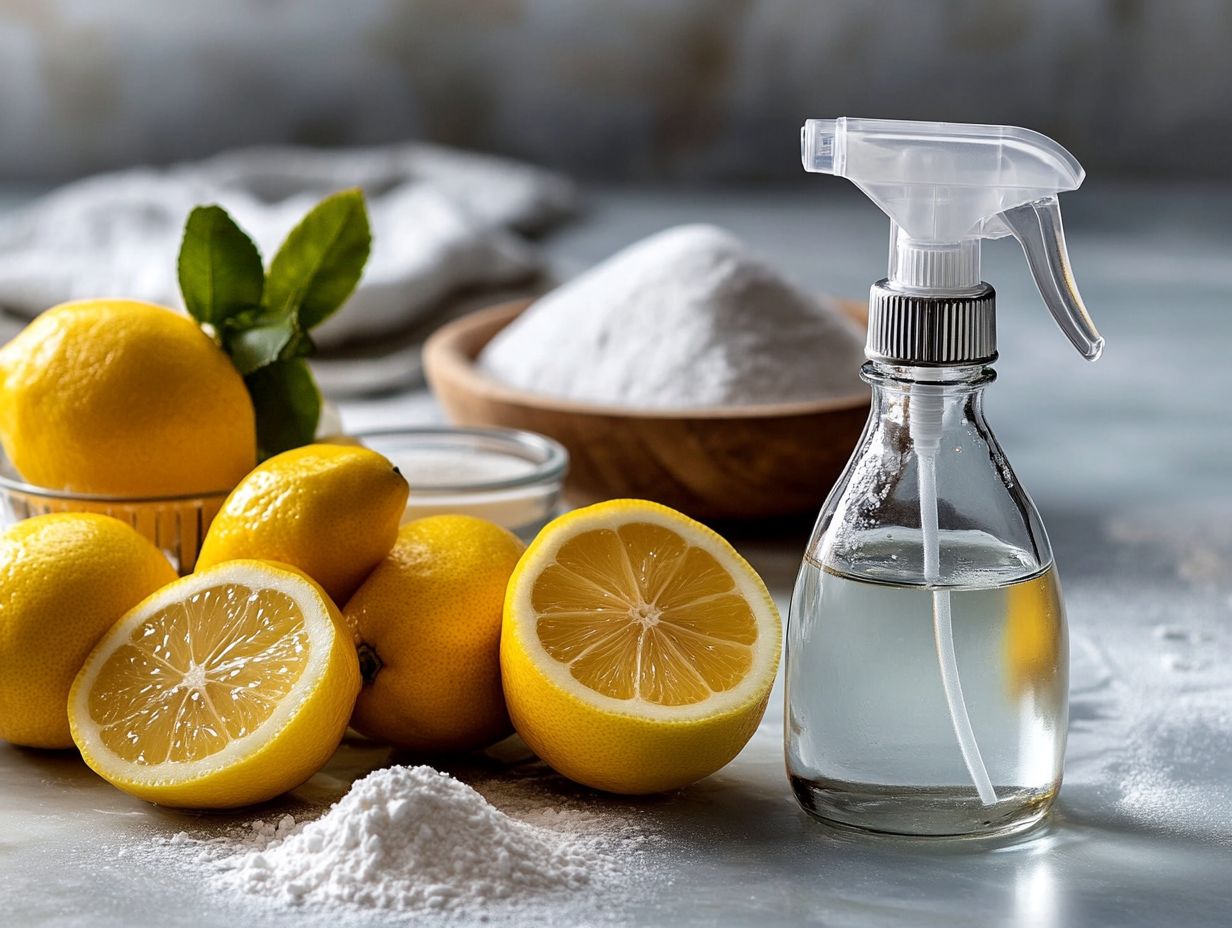
What is a homemade cleaner to remove hard water deposits?
A homemade cleaner to remove hard water deposits is a natural and inexpensive solution made from household ingredients that effectively removes mineral build-up on surfaces caused by hard water.
What ingredients are needed to make a homemade cleaner to remove hard water deposits?
Ingredients commonly used to make a homemade cleaner for hard water deposits include white vinegar, baking soda, lemon juice, and citric acid.
How does white vinegar work to remove hard water deposits?
White vinegar contains acetic acid, which is a natural acid that breaks down and dissolves mineral deposits left by hard water.
Can a homemade cleaner to remove hard water deposits be used on all surfaces?
Yes, most homemade cleaners for hard water deposits are safe to use on a variety of surfaces such as glass, tile, chrome, and stainless steel. However, it is always best to test a small area first before using it on a larger surface.
How often should I use a homemade cleaner to remove hard water deposits?
The frequency of use will depend on the severity of the hard water deposits. For light build-up, using the homemade cleaner once a week should be sufficient. For heavier build-up, it may need to be used more frequently.
Are there any precautions I should take when using a homemade cleaner to remove hard water deposits?
It is important to wear gloves and work in a well-ventilated area when using homemade cleaners with strong acids such as vinegar. Also, avoid mixing vinegar with bleach or ammonia, as this can create toxic fumes.
Now that you have these tips and precautions, experiment with your homemade cleaner and share your results!

